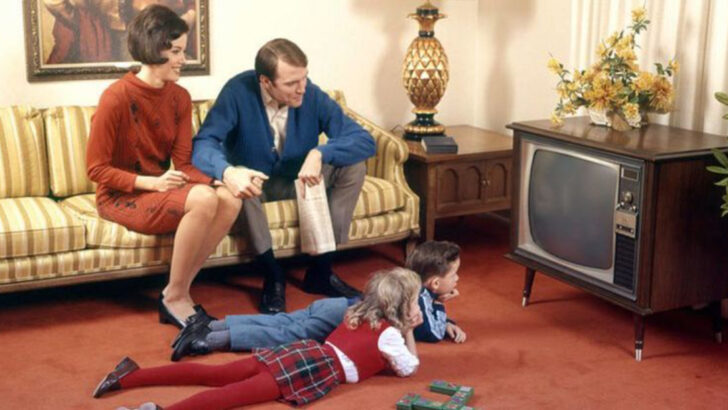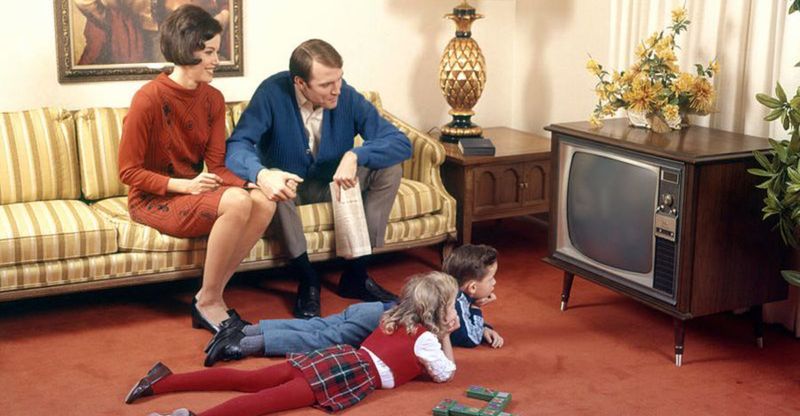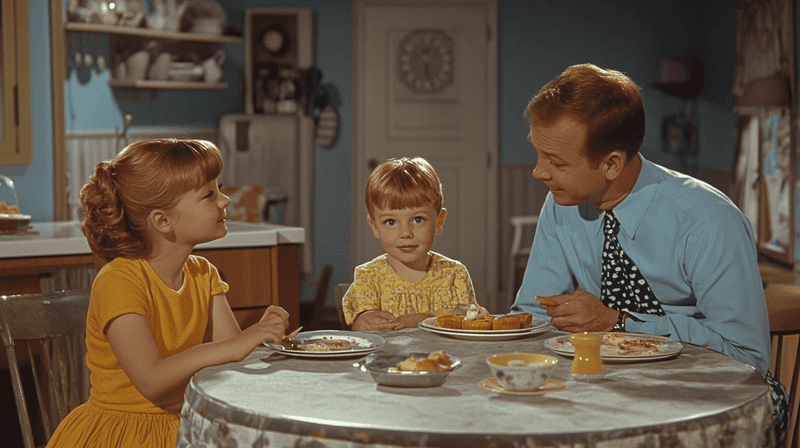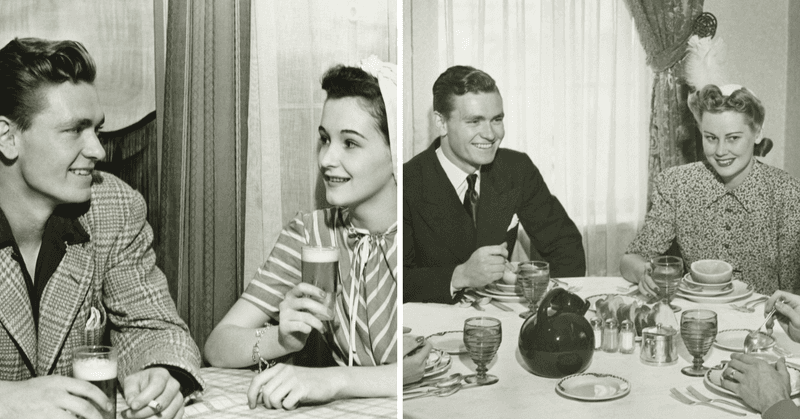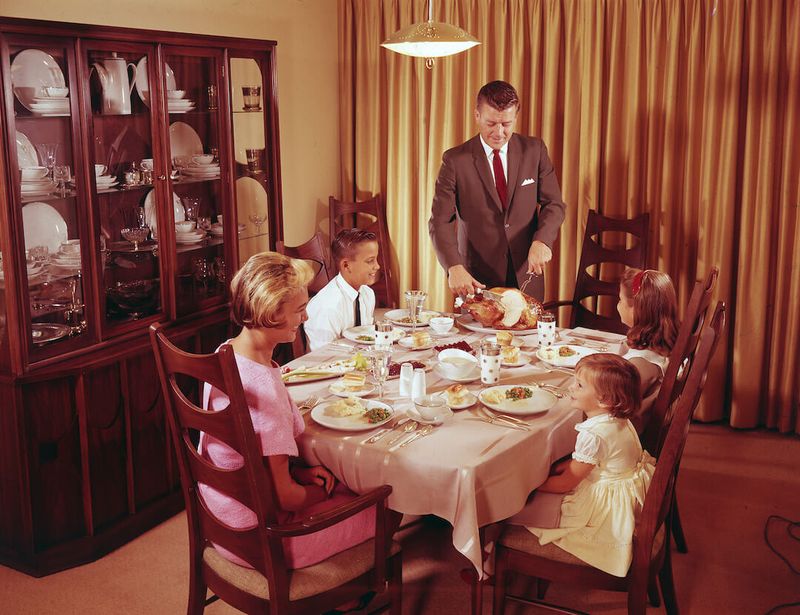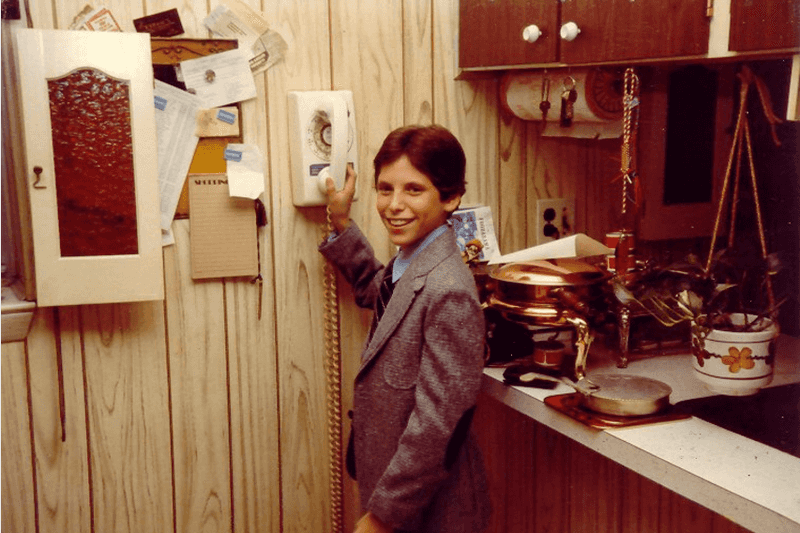Sejamos realistas: The world most boomers grew up in is basically another country now. There were rules—actual, non-negotiable laws of childhood and family life—that shaped everything from bedtime to how you said thank you.
If you ever wondered why your parents seemed so rigid about dinner or why your grandma cared so much about table settings, you’re about to get answers. You might laugh, cringe, or even feel a pang of nostalgia.
Whether you see these rules as outdated, oddly comforting, or just plain wild, you’ll spot the fingerprints of another era—one where respect, structure, and ritual weren’t just suggestions. They were the air people breathed.
Ready for some emotional whiplash and a few “wow, we really did that?” moments? Good. Let’s talk about the 16 rules every boomer knew by heart—and why most have disappeared.
1. Children Must Be Seen and Not Heard
Picture this: a living room humming with adult conversation, and in the corner—kids perched like statues. Not a peep, no interruptions, just wide eyes soaking in the world of grown-ups. It wasn’t just about manners; it was survival. You learned to listen, not to speak.
If you blurted out a question, the room froze. Someone might offer a sharp glance or a polite but pointed, “Children are to be seen, not heard.” That wasn’t cruelty, it was conditioning. You got used to swallowing your words, even when your brain buzzed with things to say.
This rule hammered in respect for elders, patience, and a strange kind of emotional economy. But let’s be honest—it also taught some of us to disappear in plain sight. The echo of those silent afternoons sticks with people long after childhood ends. Did it teach discipline, or did it shrink us? Maybe both. The debate is still going, but the rule itself? Mostly gone.
2. Strict Bedtimes
Strict bedtimes weren’t just a suggestion in boomer households. The clock struck seven or eight, and the world shut off for kids—no arguments, no delayed stories, just the steady ritual of getting tucked in. Sleep wasn’t seen as negotiable or something to be bartered for extra TV time.
Why the obsession with early bedtimes? Part of it was the belief that well-rested kids were better behaved. Another side of it: parents wanted peace, adult time, and maybe a chance to watch a show that wasn’t for little ears. There was discipline in the routine—a clear line between childhood and the adult world.
Sometimes, older siblings plotted quiet escapes after lights out, but the memory of being marched back to bed stings. Today, screens glow past midnight in kids’ rooms, and sleep schedules are flexible. Back then, bedtime was sacred—and the rules drew boundaries around childhood.
3. Sundays Are for Church
Sundays carried a kind of electricity. No matter how wild Saturday night felt, Sunday morning snapped everyone into crisp clothes and quiet anticipation. Church wasn’t just about faith; it was about belonging, routine, and showing the world you respected something bigger than yourself.
Kids squirmed in pews, counting the minutes, while parents exchanged small glances across hymnals. For many families, missing church simply wasn’t an option. Afterwards, there was the ritual of brunch—the echo of choir songs still hanging in the air.
Even if you questioned the sermons, you went. It was about community, not just belief. Today, Sunday mornings look different. Yoga pants replace church dresses, and spiritual routines are more personal, less public. But in many boomer homes, Sunday belonged to church and all that came with it.
4. Television as a Privilege
Television wasn’t always an open invitation. For boomers, the TV seemed sacred—a glowing box only switched on if you’d earned it. Chores finished? Homework done? Maybe you’d get half an hour before dinner, crowded together for the evening news, or a favorite cartoon.
It wasn’t just about managing screen time; it was about teaching that fun had to be earned, not expected. There was something about sitting there, parents hovering, that made every minute feel special. You didn’t flip through endless channels—choices were few, and you watched together.
Today, everything’s “on demand,” and a kid can stream anything, anywhere. But back then, TV served as a family event, a reward, and sometimes, a battleground. You remember the fights over what show to watch—winner took all. It taught patience, compromise, and sometimes, a little heartbreak when your pick lost.
5. No Shoes in the House
Picture coming home from school, the first thing you heard was, “Shoes off!” There was a kind of ritual about it—untying laces, stacking sneakers with care. For boomers, leaving shoes at the door wasn’t just about dirt; rather respect for the space where family lived.
You learned that home was different from the outside world. Muddy footprints meant a scolding and maybe extra scrubbing duty later. It made you think twice before barreling in, carefree and oblivious.
Now, some homes don’t care, and sneakers cross the threshold without pause. But for a generation, this simple rule marked the line between chaos and comfort. It was a way to honor the place that gave you shelter—one pair of shoes at a time.
6. Chores Before Playtime
Here’s a picture you can almost smell: soap suds, the clatter of dishes, and the high-pitched whine of a vacuum. Playdates didn’t happen until beds were made, sinks were empty, and lawns were trimmed. Chores weren’t considered punishment—they were a ticket to freedom.
Boomers learned early that nothing fun came free. The faster you finished, the quicker you escaped to bikes and hopscotch. But skip a chore, and the whole day soured.
Maybe it taught accountability. Maybe it just made Saturdays feel twice as long. Either way, this rule stitched a kind of work ethic into everyday life. These days, play sometimes comes first and chores get squeezed in. Back then, there was no deal-making; work before play was carved in stone.
7. Respect Your Elders
In boomer households, respect wasn’t a throwaway word. It rode on every “Yes, ma’am,” and “No, sir,” and echoed in the way you waited to speak. Elders were more than relatives—they were living authority.
You’d never call a teacher or neighbor by their first name. The formality shaped relationships and kept lines clear. Even when you disagreed or felt misunderstood, you stepped lightly.
It could be stifling, but it also offered a structure that some people miss now. Today, things are less formal, and sometimes, boundaries blur. That old rule might feel stiff, but for boomers, it taught how to move through the world with a little extra care—and maybe, a little caution.
8. Homework Before Television
After school, the TV called like a siren, but there was no use pleading. Homework first, always. You could practically feel your friends watching cartoons as you slogged through math problems.
Parents enforced this rule with ironclad certainty. It shaped priorities and, for some, made the rewards feel sweeter. There was a sense of accomplishment in earning your way to fun.
Did it spark resentment? Sometimes. But for many boomers, this rule put education squarely at the center of the day. These days, Netflix and homework often happen at the same time—but that old order, for better or worse, instilled a sense that work comes before pleasure.
9. No Phone Calls After Dinner
The house settled into a hush after dinner. The phone hung on the wall—present but off-limits. You might stare at it, desperate to call your best friend and recap the day, but the answer was always, “No calls after dinner.”
For boomers, evenings belonged to family. It was a time to share stories, play a board game, or just listen to the quiet. Phone calls were considered an intrusion, a distraction from the only time everyone was together and unhurried.
Now, phones are glued to our hands, and boundaries blur. But back then, this simple rule made the hours after dinner feel intentional—like the world outside could wait until tomorrow. Privacy and connection lived side by side, and the phone was just another guest who had to wait its turn.
10. Eat Everything on Your Plate
Staring down a plate full of peas, you learned negotiation early. The clean plate club wasn’t just folklore; it was a badge of honor. Leaving food behind felt like breaking some secret code.
Parents talked about starving children and wasted money—a guilt trip disguised as a lesson in gratitude. You choked down cold carrots, not out of hunger, but because it was expected. Every bite was proof you appreciated effort and resources.
Today, food waste is still an issue, but the pressure to finish everything has faded. Some see it as progress, others as loss. For boomers, though, the lesson stuck: waste not, want not—even when your appetite begged for mercy.
11. No Talking Back
Snarky comebacks weren’t tolerated. If you pushed back on a rule or questioned a decision, the answer was swift—sometimes a look, sometimes harsher. Boomer parents saw talking back as a sign of disrespect, not independence.
You learned when to hold your tongue, even if it burned. The power dynamic was clear: adults spoke, kids listened. It was about keeping order, but sometimes it came at the cost of honest conversation.
Today, children are encouraged to speak up, to question and express themselves. Was that old silence golden? Or did it just teach people to swallow hard truths? The debate still echoes in family dinners across generations.
12. Handwritten Thank-You Notes
Aunt Eileen sent you a sweater you’d never wear. Still, you sat at a desk, pen in hand, writing out a thank-you note. No shortcuts, no texts—just careful words, set down in your wobbly script.
Boomers learned that gratitude required effort. Notes were a ritual, and the right card mattered. You learned to say thanks in a way that felt real, not rushed.
These days, a text or emoji replaces paper. The world moves faster. But for a generation, the handwritten note wasn’t about stationery—it was about slowing down long enough to really mean it. It was an art, and sometimes, a test of patience. But it left a mark, one envelope at a time.
13. Dressing for Dinner
Getting ready for dinner felt a little like prepping for an event. Out came the nice shirt, maybe a dress, hair brushed and faces washed. Even if the meal was meatloaf and peas, it mattered how you showed up.
There was pride in the ritual. Boomers grew up learning that dressing for dinner wasn’t about fashion—it was about respect, for the meal, for family, and for yourself. It marked dinner as something worth pausing for.
Today, sweatpants are standard fare, and the ceremony is mostly gone. But there was a certain magic in the way a family gathered, dressed and ready, as if the meal deserved its own quiet celebration. It set the evening apart from the chaos of the day.
14. Offering Seats to Others
Here’s a rule that could turn a shy kid into a hero for a day: on the bus, in a waiting room, you always offered your seat. Boomers learned early that kindness had a physical form—sometimes, it looked like standing on tired legs.
You caught praise from adults and an embarrassed smile from the person you helped. The lesson stuck: you weren’t the center of the universe, and empathy demanded action, not just feeling.
In today’s rush, the custom is fading. But for boomers, offering a seat wasn’t just about manners; it was about recognizing the needs of others—one small act at a time. It was a way to show you saw people, not just passed them by.
15. Formal Dinner Table Settings
Setting the table was a lesson in geometry and patience. Every fork, knife, and spoon had its place. Boomers learned the difference between salad forks and dessert spoons before they could spell etiquette.
Sometimes it felt fussy, but it was about more than looks. It was an exercise in respect—for food, family, and tradition. The right setting made dinner feel like an event, not just a pit stop.
Today, mismatched plates and takeout containers are the norm. But that sense of occasion, that pause to get things right, shaped the rhythm of boomer family life. It was about creating space for connection, even if the meal was simple.
16. Proper Telephone Manners
You picked up the receiver with a nervous gulp. “Smith residence, this is Jenny speaking.” That was the script, and you learned it by heart. Politeness wasn’t optional; it was the price of entry.
Boomers were drilled in proper telephone manners: don’t interrupt, take messages carefully, speak clearly. Each call was a chance to show you belonged in the adult world—even if your knees knocked the whole time.
Now, most calls are texts and nobody answers unknown numbers. But for a generation, those calls were the heartbeat of family life, and every ring was a chance to practice being a little more grown up. Etiquette wasn’t just for show—it was a way into the world.

